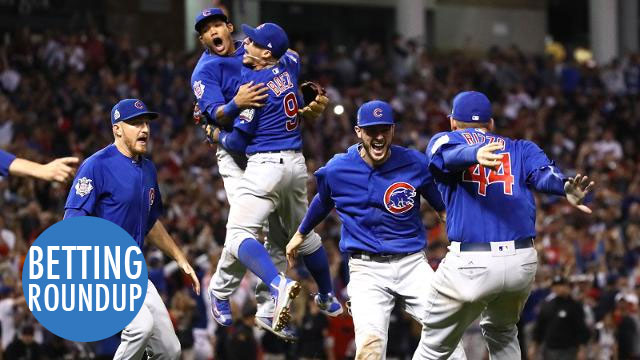Twice weekly, we’ll comb through as many articles, tweets and podcasts as we can find related to the world of sports betting and daily fantasy sports, and publish the good stuff here.
Stumble upon something you think we should include? Email info@bettingtalk.com.
* * *
Baseball betting topped $1 billion in Nevada annually for the first time this year.
Through October, $1 billion was bet on baseball at Nevada’s regulated sportsbooks, an all-time record, according to gaming control, and nearly double the amount that was bet in 2010. By comparison, $1.6 billion was bet on football (NFL and college) in 2015.
At a time when more money is being wagered on baseball than ever before, Major League Baseball is taking a new approach to how it keeps track of the betting on its games.
A two-hour workshop highlighting potential benefits of legal sports betting, and the technology available to protect the integrity of the games, was held Monday at Major League Baseball’s winter meetings in Washington, D.C.
DraftKings and FanDuel are preparing their argument against antitrust concerns for their planned merger to federal agencies.
Before they can join forces, however, the companies will have to get past a new regulatory problem: After a merger, the combined company would control 90 percent of the daily fantasy market, a level of market power that could raise eyebrows at the Federal Trade Commission.
In the coming days, the companies are expected officially to notify the FTC and the Department of Justice of their plans to merge. The FTC, which will take the lead in the review process, can decide either to reject or approve the deal, possibly with conditions.
An agency spokesperson declined to comment, as did DraftKings and FanDuel. But while their conversations are being conducted behind closed doors, people who follow fantasy sports say the companies will avoid the strongest argument they could make—that a major competitor is the sports betting market.
The standard playbook for merging companies is to make expansive claims about how many companies are their competitors. “You can point to legal and illegal sports betting—for which daily fantasy sports is a substitute—or non-daily fantasy sports,” said Thomas Brown, a partner at the law firm Paul Hastings who focuses on antitrust law.
A Nevada representative is appealing to President-elect Donald Trump to oppose a group of state attorneys who are petitioning for a ban on online gambling.
According to Fox News, Titus says: “The letter submitted by the attorneys general contains several inaccuracies and unfair allegations. Gaming regulation in the state of Nevada is considered the international gold standard.”
“I encourage you [Trump] to carefully study this issue before making any decisions that would infringe on state’s rights or eliminate jobs in the gaming industry.”
A Pennsylvania senator is appealing to lawmakers in his state to slow down on regulation of daily fantasy sports.
In the correspondence from Tomlinson (full letter here), the state senator advocates for his fellow lawmakers to fix a casino tax deemed to be unconstitutional, while waiting on other issues related to gaming.
From the letter:
Given the complexity of these issues and the potential to harm “the goose that lays the golden eggs” (i.e., the existing industry), our leaders were smart not to rush into new gaming legislation.
Tomlinson is alluding to the Senate’s decision only to pass a bill fixing the tax. That body has ignored the House version of the bill that tacked on various gaming expansions. (The House passed such an omnibus gaming bill on more than one occasion in 2016.)
He lumps DFS into this category.
